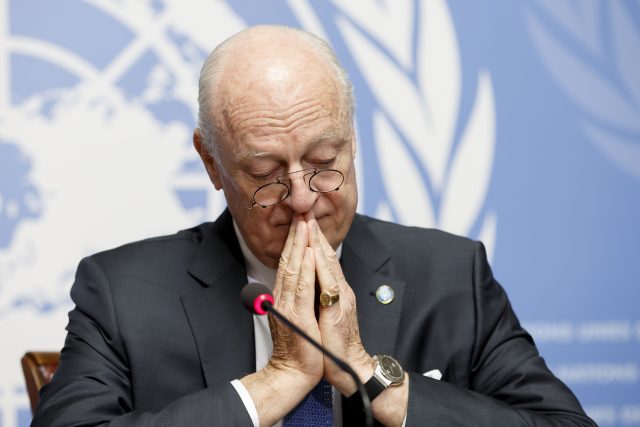The next step reaching peace in Syria

UN Special Envoy of the Secretary-General for Syria, Staffan de Mistura , informs the media at the European headquarters of the United Nations in Geneva, Switzerland, Monday, March 14, 2016. Mistura calls peace talks "a moment of truth," says the "only Plan B available is return to war." Steffan de Mistura spoke to reporters just moments before resuming "proximity talks" in Geneva slightly over a month after suspending them in an upsurge in violence in Syria. (Salvatore Di Nolfi/Keystone via AP)
The Washington Times/ Staffan de Mistura
More than 250,000 Syrians have lost their lives in armed conflict, which began with anti-government protests before escalating into a civil war. More than 11 million people have been forced to leave their homes as forces loyal to President Bashar al-Assad and opposition has battled with each other – as well as jihadist militants from called Islamic State (ISIS).
Long before the conflict began, Syrians were complaining about high unemployment, corruption, a lack of political freedom and state repression under President Bashar al-Assad. The volcano of resentment erupted in March 2011, in the southern city of Deraa after some teenagers were tortured and arrested after painting revolutionary slogans on a school wall. It was the decisive moment to start the reformation. Opposition supporters started revolution and forces opened fire. As a result, the conflict descended into civil war as rebel brigades were formed to battle government forces. Fighting reached the capital Damascus and second city of Aleppo in 2012. The conflict is now more than just a battle between those for or against Mr Assad. The rise of the jihadist group Islamic State (IS) has added a further dimension and spiced up the conflict. IS has also been accused by the UN of pursuing the terror.

Syria’s foreign minister Walid al-Moualem said earlier on Monday that Damascus would abide by Russia’s plan for such zones if rebels also observed it, adding that the insurgents should help drive Islamist militants from opposition-controlled areas.With human rights violations at the heart of the Syrian crisis, the UN has called for an immediate end of violence by creating peace talks summit. The UN believes that only political solution could end the conflict in Syria. Unfortunately, the talks in early 2014, known as Geneva II, collapsed after only two rounds, with then-UN special spokesman Lakhdar Brahimi blaming the Syrian government disclaims to discuss opposition demands. The last peace talk summit took place between 23 February and 3 March 2017, in Geneva, trying to resolve the Syrian Civil War. However, the warring sides did not get to face-to-face negotiations. The newest try to resolve the conflict between the government and opposition envoys have started on Tuesday, May 16th, marking the sixth round of talks mediated by Staffan de Mistura since early last year. The talks focus on governance, a schedule and process to draft a new constitution and the holding of elections as the basis for a Syrian-led, Syrian-owned process to end the conflict. Staffan de Mistura (Mr Brahimi’s successor) said ‘the Syrian government delegation is here to work’ after Assad said that ‘nothing substantial’ would come out of the summit, which was ‘merely a meeting for the media’. Assad said he was more interested in the plans for de-escalation zones set out by Turkey, Russia and Iran at separate talks held in the Kazakh capital, Astana early this year. He also claimed to be encouraged that the US administration of Donald Trump was showing ‘increasing interest and engagement’ in the Syria peace process, and suggested de-escalation zones might require the presence of international military help by the UN security council. In a statement, de Mistura voiced hope that the agreement reached last week in Astana among Russia, Iran and Turkey to set up de-escalation zones in Syria will be implemented in full ‘thus bringing about a significant de-escalation in violence, and helping shape an environment conducive to the political intra-Syrian talks in Geneva’.
To sum up, as war approaches the seventh year of Syria’s civil war, the whole international community remains completely inept and has failed to join together in the search for a solution. The newest news from BBC news announced that on the 1st day of UN Syria peace summit the United Nations have failed to bring the two sides together in direct negotiations. It´s difficult to know the evolution of the conflict, but at this moment, both sides are not willing to solve the problem and the war continues.
Julija Kolosova


